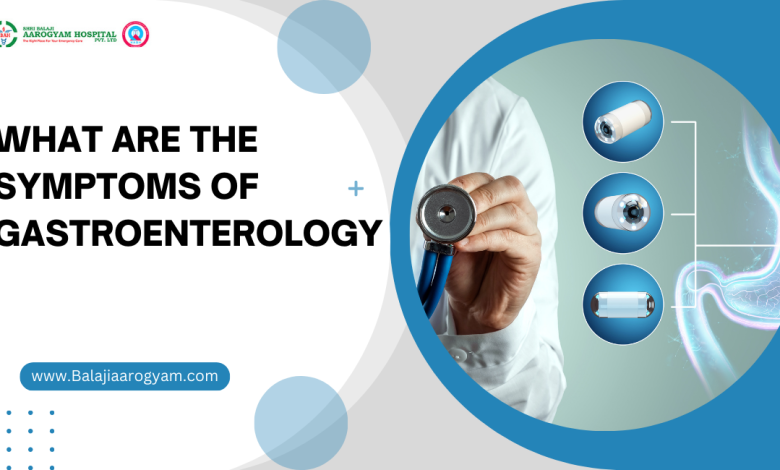What are the symptoms of gastroenterology
What are the symptoms of gastroenterology

The gastrointestinal system, also known as the digestive system, is responsible for breaking down food into nutrients that can be absorbed and used by the body. It includes organs such as the mouth, esophagus, stomach, small intestine, large intestine, rectum, and anus. The proper functioning of the gastrointestinal system is essential for maintaining overall health and well-being. However, various disorders can affect the gastrointestinal system, leading to a range of symptoms that can significantly impact a person’s quality of life. In this outline, we will explore the common symptoms of gastrointestinal disorders, as well as specific disorders and when to seek medical attention.
Also read: What is Gastroenterology
Common gastrointestinal symptoms
Common gastrointestinal symptoms can vary in severity and duration, and they can affect different parts of the digestive system. Here are some of the most common gastrointestinal symptoms:
- Abdominal pain: This can range from mild discomfort to severe pain, and it can be caused by a variety of factors such as inflammation, infection, or obstruction.
- Bloating: This is a feeling of fullness or tightness in the abdomen caused by excessive gas in the digestive system.
- Constipation: This refers to infrequent bowel movements or difficulty passing stools, which can cause discomfort and abdominal pain.
- Diarrhea: This is the opposite of constipation and refers to loose, watery stools that can be caused by infections, dietary changes, or other factors.
- Nausea and vomiting: These symptoms can be caused by a variety of factors such as infections, food poisoning, or motion sickness.
These symptoms can be caused by various gastrointestinal disorders and can significantly impact a person’s quality of life.
Less Common GI Symptoms
Sure, here are some less common GI symptoms that may be associated with certain gastrointestinal disorders:
- Rectal bleeding: This refers to the passage of blood from the rectum or anus.
- Black, tarry stools: This may indicate the presence of digested blood in the stool, which is known as melena. It
- Unexplained weight loss: Losing weight without trying may be a symptom of several GI disorders, including celiac disease, Crohn’s disease, or pancreatic cancer.
- Jaundice: This is a yellowing of the skin and whites of the eyes caused by an excess of bilirubin in the blood. It can be a sign of liver disease, such as hepatitis or cirrhosis, or pancreatic cancer.
- Excessive gas or belching: While gas and belching are normal bodily functions, excessive amounts can be a sign of underlying GI disorders such as lactose intolerance, celiac disease, or small intestinal bacterial overgrowth (SIBO).
- Fatigue: Feeling excessively tired or weak may be a symptom of several GI disorders, including IBD, chronic liver disease, or celiac disease.
Rectal bleeding
It can appear as bright red blood on the surface of the stool or as blood mixed with stool, and it can be a sign of a serious medical condition.
There are several potential causes of rectal bleeding, including hemorrhoids, anal fissures, diverticulitis, inflammatory bowel disease, colorectal cancer, or other conditions. Factors that increase the risk of rectal bleeding include age, family history of colon cancer, a history of gastrointestinal disorders, prolonged constipation or diarrhea, and certain medications.
If you experience rectal bleeding, it’s important to seek medical attention. Early diagnosis and treatment can be crucial for preventing complications and improving outcomes.
Specific gastrointestinal disorders and their symptoms
There are several specific gastrointestinal disorders, each with its own set of symptoms. Here are some examples:
- Gastroesophageal reflux disease (GERD)
- Heartburn: a burning sensation in the chest or throat that occurs after eating or at night
- Regurgitation: the sensation of acid or food coming back up into the mouth
- Dysphagia: difficulty swallowing
- Irritable bowel syndrome (IBS)
- Abdominal pain or discomfort: often relieved by passing stool or gas
- Changes in bowel habits: diarrhea, constipation, or alternating between the two
- Bloating or gas: caused by excess gas in the digestive system
- Inflammatory bowel disease (IBD)
- Abdominal pain: often in the lower abdomen
- Diarrhea: often with blood and mucus
- Weight loss: due to malabsorption of nutrients
- Fatigue: due to inflammation and anemia
- Celiac disease
- Abdominal pain: often in the upper abdomen
- Bloating: caused by malabsorption of carbohydrates
- Diarrhea: often fatty and foul-smelling
- Weight loss: due to malabsorption of nutrients
- Fatigue: due to malnutrition
These are just a few examples of the many gastrointestinal disorders that can cause symptoms.
When to seek medical attention
If you experience persistent or severe gastrointestinal symptoms, it’s important to seek medical attention. Here are some signs that you should see a healthcare professional:
- Persistent or worsening symptoms: If your symptoms last for more than a few days, or if they are getting worse over time, it’s time to see a doctor.
- Symptoms that interfere with daily life or activities: If your symptoms are preventing you from going to work, school, or participating in activities that you enjoy, it’s important to seek medical attention.
- Symptoms that are accompanied by other worrisome signs: If you experience other symptoms such as fever, unexplained weight loss, blood in stool, severe abdominal pain, or vomiting, it’s important to seek medical attention right away.
- Family history of gastrointestinal disorders: If you have a family history of gastrointestinal disorders such as colon cancer or inflammatory bowel disease, it’s important to get screened regularly.
Overall, if you are concerned about your gastrointestinal symptoms, it’s best to consult with a medical professional to determine the underlying cause and receive appropriate treatment.
Conclusion
In conclusion, the gastrointestinal system plays a crucial role in the digestion and absorption of nutrients that are essential for maintaining overall health and well-being. Common gastrointestinal symptoms such as abdominal pain, bloating, constipation, diarrhea, and nausea can significantly impact a person’s quality of life. There are various gastrointestinal disorders, each with its own set of symptoms, such as GERD, IBS, IBD, and celiac disease. It’s essential to seek medical attention if you experience persistent or severe gastrointestinal symptoms, symptoms that interfere with daily life, symptoms that are accompanied by other worrisome signs, or if you have a family history of gastrointestinal disorders. A proper diagnosis from a healthcare professional is crucial for the effective treatment and management of gastrointestinal disorders.




